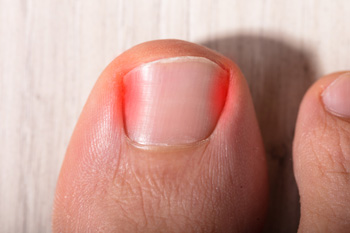
An ingrown toenail occurs when the nail of the big toe grows into the surrounding nail bed instead of over it. The main symptom of an ingrown toenail is pain, especially when wearing tight shoes and socks or putting pressure on the toe. If left untreated, the area around the ingrown toenail can become inflamed and red, while fluid builds up as a protective measure. If infected, white or yellow pus may form. The major cause of an ingrown toenail is improper foot care, particularly when the toenails are cut too short or rounded on the edges instead of straight across. Other causes are wearing shoes and socks that are too tight, an injury like stubbing the toe, or sweaty feet. Prevention of an ingrown toenail begins with keeping your feet clean and dry, changing socks regularly, and cutting toenails straight across. Next, wear comfortable shoes that allow the toes to move around rather than being squeezed together. If an ingrown toenail becomes too painful or infected, it is suggested that you make an appointment with a podiatrist who can determine the best treatment.
Ingrown toenails can become painful if they are not treated properly. For more information about ingrown toenails, contact Brandon M. Zuklie, DPM of New Jersey. Our doctor can provide the care you need to keep you pain-free and on your feet.
Ingrown Toenails
Ingrown toenails occur when a toenail grows sideways into the bed of the nail, causing pain, swelling, and possibly infection.
Causes
- Bacterial infections
- Improper nail cutting such as cutting it too short or not straight across
- Trauma to the toe, such as stubbing, which causes the nail to grow back irregularly
- Ill-fitting shoes that bunch the toes too close together
- Genetic predisposition
Prevention
Because ingrown toenails are not something found outside of shoe-wearing cultures, going barefoot as often as possible will decrease the likeliness of developing ingrown toenails. Wearing proper fitting shoes and using proper cutting techniques will also help decrease your risk of developing ingrown toenails.
Treatment
Ingrown toenails are a very treatable foot condition. In minor cases, soaking the affected area in salt or antibacterial soaps will not only help with the ingrown nail itself, but also help prevent any infections from occurring. In more severe cases, surgery is an option. In either case, speaking to your podiatrist about this condition will help you get a better understanding of specific treatment options that are right for you.
If you have any questions please feel free to contact our offices located in Piscataway, Jamesburg, and Branchburg, NJ . We offer the newest diagnostic and treatment technologies for all your foot and ankle needs.
